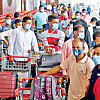Highlight migrant workers' rights

Labour migration analysts and businesses have expressed optimism that Prime Minister Sheikh Hasina will highlight Bangladeshi migrant workers' rights during her meeting with Saudi King Salman bin Abdulaziz Al Saud today.
They said there have been numerous reports of female Bangladeshi workers being exploited by their Saudi employers and also male workers facing joblessness and deportation as the Middle Eastern country has been implementing labour and economic reforms, giving priority to employing locals.
Shariful Hasan, head of Brac's Migration Programme, said the PM's visit to Saudi Arabia was taking place at a very important time. “We expect her to raise the rights issues of our migrant workers.”
The PM arrived in Riyadh last evening (Saudi time) on a four-day official visit to Saudi Arabia at the invitation of the king.
Shariful said although there were many economic and political issues, Bangladesh should raise the most important one, protection of migrants' rights, with Saudi Arabia.
According to Bureau of Manpower, Employment and Training (BMET), Saudi Arabia has recruited nearly 36 lakh Bangladeshis since 1976. It is now the largest overseas labour market for Bangladesh as around two million Bangladeshis are employed there. Last year, they sent home Tk 110,247 crore.
The incumbent Saudi government has restricted foreigners from working in 12 sectors. They cannot work in shops selling watches, optical materials, medical equipment, electrical and electronic products, car parts, building materials, carpets, and mobile phones.
Also, the Middle Eastern country early last year introduced a levy system under which a Saudi company needs to pay a monthly charge of $80 to the government for hiring each foreign worker, according to Saudi media reports.
Bangladesh Ambassador to Riyadh Golam Moshi recently told this correspondent that some 80,000 Bangladeshis employed in mobile phone shops in Riyadh became jobless after the Saudi authorities restricted foreigners from working in such shops in September last year.
According to the Expatriates' Welfare Desk at the Hazrat Shahjalal International Airport in Dhaka, nearly 15,000 Bangladeshi workers returned home from Saudi Arabia in the first eight months this year.
Besides, around 1,500 female workers came back home till now this year following alleged exploitation by their employers. The abuses include physical and sexual exploitation, long working hours and non-payment.
Some male returnee migrants recently alleged that the Saudi authorities deported them despite the fact they had iqamas (residence permits).
Ambassador Golam Moshi said it was illegal for a worker having a valid iqama to work for a company which did not hire him.
“The law is now being enforced in the Kingdom strongly,” he said.
Talking to The Daily Star on Monday, Golam Moshi said the PM would request the Saudi authorities to recruit Bangladeshi workers for their new mega projects.
Analysts say although new recruitment is important, Bangladesh must ensure that those who are already in Saudi Arabia have jobs.
“We have reports that a good number of Bangladeshi workers in Saudi Arabia are jobless,” said Shameem Ahmed Chowdhury, secretary general of Bangladesh Association of International Recruiting Agencies.
He said the reports on abuse of female Bangladeshi migrants were also disturbing.
“Our prime minister can raise the issue with the Saudi authorities so that the female migrants can work there with dignity,” Shameem told The Daily Star.
Abdul Alim, a recruiting agent in Dhaka, said some recruiters in connivance with a section of Saudi employers send workers for jobs that are non-existent. After reaching Saudi Arabia, they have to find their jobs and pay to the “sponsors” who facilitated the visas.
“This malpractice should be stopped,” he said.
Alim suggested opening of a desk at the Saudi labour ministry to enable the recruiting agents to report on abuses of female migrants.
If actions were taken against abusers, the number of abuses would come down drastically, he said.

 For all latest news, follow The Daily Star's Google News channel.
For all latest news, follow The Daily Star's Google News channel. 









Comments